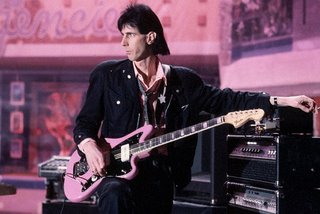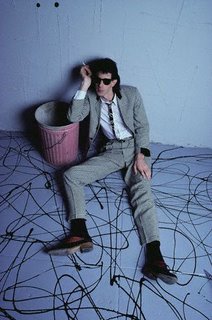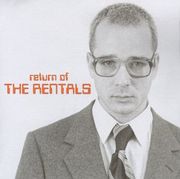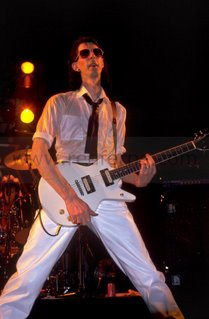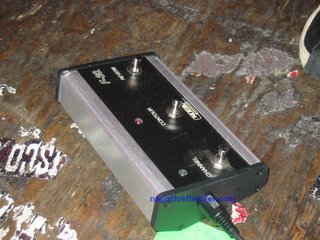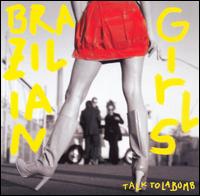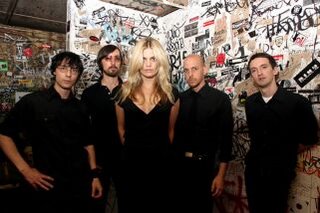
Should this article be refiled in Noisician Magazine ? This is one of the more fact finding interviews you are going to read about Ric and his music and his philosophy. This is not the standard interview. It's a long read but for diehard Ric Ocasek fans is there any such thing ?
Troub
Ric Ocasek
By David Fricke Ric Ocasek swings back and forth to some imaginary rhythm in his swivel chair in the control room of Syncro Sound Studios in Boston, his gangly giraffe legs drawn up jackknife-style under his pointed chin. In black-and-white op-art threads with his thick black hair drawn back like a plumed helmet from his long oval face, he sits at the 24-track mixing desk with its knobs, lights and jumping needles like some praying beatnik mantis at the helm of an intergalactic space ship. On the other side of the studio window, vocalist Alan Vega is preparing his band for take-off.
The song is called "Video Babe," a pumping rockabilly drone that marries the primal minimalism of Vega's work in the electronic duo Suicide with rip snorting Sun Sessions twang. While his backing trio- all heavy hitters on guitar, bass and drums-hammer down the beat, Vega whispers, coos, screams and grunts about the "video babe" and the "neutron raiders, uh-huh!" like Iggy Presley. Back at the desk, Ocasek almost imperceptibly tweaks the echo and delay on Vega's voice and the drums, already mapping Out a potential mix while the band records a few takes live.
But Vega is not happy and the oppressive heat inside the studio (the building's ventilation is on the fritz) is not helping. Buzzing around the control room like a bee on speed, Vega listens to the takes of "Video Babe" and complains that the beat is just not right, that it is not what he calls "in that p/ace." Ocasek thinks the takes are good, almost there. To ease the tension, he gives the band an encouraging word and then turns to Vega with a sly grin.
"Don't worry, Alan. If it gets too good-he gestures at his engineer and tape operator- "we'll screw it up.
But there will be none of that tonight. Not only will Ocasek cut four songs with Vega and his band before calling it quits at 5:00 am., but he will also spring on Vega seven new instrumental tracks he recorded himself the night before with a Korg synth and a live drummer-real rock n' roll Suicide stuff-to which he wants Vega to add lyrics and vocals. Alan Vega came to Boston to cut a four-track EP Ocasek will send him home a couple of days later with an album.
Ric Ocasek gets a lot of work done-writing and recording with flash popsters the Cars, producing the likes of Vega and Romeo Void and cutting his own solo LP Beatitude-because he does not spend a lot of time worrying about what critics say about him. He is not offended by complaints that the Cars are a soulless hit machine whose tenuous connections with the new wave are an embarrassment to the real thing; that his songs and sound draw on a dwindling supply of Roxy Music and Velvet Underground cliches set off by top-forty sparkle; that his outside~ production projects are his penance for raking in millions with the Cars He simply doesn't understand them.
It's like the Cars are supposed to be my AM personality and the other stuff is my underground personality,' he smiles between drags on a cigarette in the basement lounge of Syncro, the Cars jointly owned studio/clubhouse. But it's basically the same. The Cars material is just approached in maybe more of a pop fashion Yet the Cars are a thinking band. They all dig Alan Vega."
Ocasek concedes that fans who love sleek Cars singles like 'My Best Friend's Girl," "Shake It Up" and even Panorama's "Touch And Go" with its booby-trap 5/4-4/4 rhythm may not fall head over heels for recent Ocasek productions by Boston art-punks the Dark or Washington, D.C. Rasta hard-core thrash band the Bad Brains. "But that just goes to show you how we use those influences. I'm inspired by those alternatives."
In fact, he encourages them. A kind of pop philanthropist, he usually brings maverick talents like the Bad Brains, pop tart Bebe Buell, Boston band New Models and Romeo Void (whose Ocasek-produced "Never Say Never" was one of '82's great dance-club spins) into Syncro Sound at drastically reduced rates, often absorbing all the costs until the band or artist places the record with a label who will foot the bill. In the case of the Bad Brains, Ocasek even assumed the group's hotel and food expenses while they were in Boston cutting their record. At the same time, he has turned down major label offers to produce A Flock of Seagulls and German punk diva Nina Hagen.
"I feel kind of a responsibility to these other groups," he insists. "Like, Jesus, this person or group is too good to be ignored. And it's also the excitement of not having to just listen to a record after it's been done, but actually being there to watch it done.
"I pretty much pick these groups when they're pretty unique within themselves already," he adds when pressed on his production technique. "I don't like to have to enforce anything extra on them. What I often do is just sort of guide them, to make sure that the sounds are interesting and different."
A good example of his discreet influence is the second Suicide album, simply entitled Alan Vega-Martin Rev-Suicide and issued by Ze/Antilles in 1980. Previously, keyboard player Rev had been egging on Vega's vocal hysteria with nothing more than a battered Univox organ ("with maybe three or tour different sounds," according to Ocasek) and a rusty rhythm machine that sounded like it was running on squirrel-power Ocasek modestly accepts only part of the credit for Suicide II's rich keyboard orchestration and weird cathedral synth grandeur, saying it was originally Rev's idea to add a Prophet and some Moog bass lines to the basic Suicide pulse. But in fact it was Ocasek who filtered out all of Rev's possible counter-lines and counter-rhythms, brightening and enriching Suicide's stark minimalism without compromising their awesome aggression.
"Well, he would run through a gamut of sounds and then I would stop him and say, 'Wait a minute. don't lose that one.' Or maybe, 'Let's use that sound for this part.' He would be trying all these different lines and I would just be the other ear, to say, think that one fits instead of all those others.'"
More recently, he offered his services to the Bad Brains after being transfixed by the raw spirituality of their Reach Out International cassette release Bad Brains. (The band, acknowledged leaders of America's outlaw punk community. were naturally suspicious. Singer H.R. gave Ocasek a three-hour lecture out in the middle of Boston Common on his Rasta philosophy before he would do his vocals.) "It was almost a mono mix." Ocasek recalls, although he recorded the band on 24-track. 'We worked on sounds for a couple of hours and when it felt like the power was there, I just said, 'Go!' They all stood in a circle, looked at each other, and then bang-bang-hang, that was it."
The Bad Brains cut sixteen basic tracks. "all the fast hardcore stuff." in one day with a little extra time allotted for the reggae dub numbers. (Four of those songs are now out on a twelve-inch EP I And I Survive/Destroy Babylon through Important Records in New York.) The only reason the vocals took longer was that when H.R. came in to sing the next day, no one noticed the van-speed switch on the tape machine was slipped on. The backing tracks ran half a key higher and H.R., Ocasek moans, 'left his voice all over the walls." He recut H.R.'s vocals a few days later-only one take per song-at a studio in Washington, D.C.
"In recording, you can spend a lot of time to make sure every sound is the way it's supposed to be," Ocasek shrugs, acknowledging the speed and surprising ease with which he makes records, the Cars included. Both 1978's The Cars and the follow up Candy-O were finished inside two weeks, from setup to final mix. "I think it's a matter of focusing energy quickly. I just put the energy in the right place to get out of it what I want."
During a brief discussion of his favorite producers, Ocasek mentions Germany's Conny Plank and his work with electropop pioneers Kraftwerk, more recent synth experimentalists Deutsch Amerikanische Freundschaft and primal British post-punk dance band Killing Joke. "All those one-line keyboard touches in the Killing Joke records are Conny Plank's ideas. They're so minimal and yet they're so right. I like the rawness of those records, yet it still sounds so real."
In a sense. Beatitude-Ric Ocasek's debut solo album and now out on Geffen Records-is quite raw. The ten songs were all conceived and, for the most part, recorded solo in Ocasek's 8-track home studio. with extra parts and mixing done on the 24-track at Syncro There are actually a couple of rather entertaining mistakes left intact. You may catch Ocasek singing the word "flucked," for example, amid the mantric synthesizers and electronic eggbeater percussion of "Out Of Control." He explains that before recording that vocal at home, he toyed with the idea of changing the line "you fucked around and waited" to "you fooled around..." to spare Geffen airplay headaches. He still hadn't made up his mind when he laid down the vocal and in his indecision came up with "flucked."
"I lust left it like that because that vocal had the feeling, you know?" he says without apology. "I didn't even try to sing it over. I could have done it right, but I could not have done it better."
Raw, blemished in spots, Beatitude sounds all the more real for it, an inviting, involving record in spite of all the synthesizers and the dark shadows crossing many of the songs. Part of it may be the double teaming of a Linn drum machine with a live drummer, impressive newcomer Stephen George of the Midwest electro-funk band Ministry. Part of it may be Ocasek's use of first-take home-recorded vocals on half the songs.
But there is something about Beatitude quite contrary to the electronic robot sterility critics seem to hear in Ocasek's work with the Cars. With the intonations of nervous paranoia in his almost conversational vocal over the electronic locomotion of "Jimmy Jimmy" and the sultry techno-disco come-on of "Prove" (try playing this side-by-side with Marvin Gaye's "Sexual Healing"), he is flirting with that point of no return where the synthesized becomes the anesthetized, seeing just how far a little human feeling can go.
"I'm all for the computers and technology in music" he insists. "But the human element, of figuring out what particular line to play, the way to play it, that's something you can't compute. You still need a sense of what really makes a song move. That's the hardest part. Programming the stuff is simple." (Note: all of the synthesizers on Beatitude were manually played with the sole exception of a sequencer, which makes a brief appearance in "Connect Up To Me.")
Ocasek further complicated the man/machine tug of wills and wires by introducing a few extra human elements on the album. In Stephen George he found a drummer who could play "really hard" but with the meticulous syncopation of a drum machine. For the six Beatitude tracks on which he plays (the rest are credited to a "Miss Linn"-geddit?), George usually copied the original drum machine rhythm from Ocasek's demo while adding his own stylish muscle in collaboration with guest bassist Darryl Jenifer of the Bad Brains, who chipped in his own punky soul. On a few tracks, Ocasek mixed the drum overdubs with LinnDrum fills in counterpoint to the already rhythmic clip of his synthesizer lines.
Another neat trick was inviting several outside players to contribute parts to a song and then pick from their various throws of the dice. Ocasek would pass tapes of a basic track on to local Boston guitarists like Fuzzbee Morse from his old band Richard & the Rabbits, Roger Greenawalt of the Dark (whose nifty Ocasek produced Darkworld EP is just out) and New Models' Casey Lindstrom and tell them to write additional parts for the song without allowing them to hear the others' ideas.
"For instance, Roger of the Dark came in with a few guitar parts for 'Prove.' The one I used was a little clicky part (a scratchy guitar figure with a disorienting rhythm of its own). But he also put a chordal thing on it that was so strange I couldn't even use it. The chordal thing changed the key and the notes in the song so when I would sing the chorus, the melody was totally different. That was great, though, because I knew if I wanted something really different, I could get Roger to play it. I knew his parts would be real off. definitely from another place."
From yet another place is the brainbusting guitar break by Fuzzbee Morse during the heavy metallic climax of "Time Bomb." "That," Ocasek recalls, "was a one-take guitar part And he also did the feedback track that goes underneath that part of the song. I said to him, 'I just want total feedback in A, lust let it ring and don't ever let it go down.' So he was out there in front of his Marshall amp doing this feedback stuff and I think he knocked off his headphones. But he didn't want to stop, so he just sat there with the thing feeding back right in his ear. He didn't even know if he was playing to the backing track anymore. The final result, according to Ocasek, "sounds like dogs crying or something."
Only three songs on Beatitude-Time Bomb," the plucky Cars-like "Something To Grab For" and "A Ouick One," which is distinguished by a chunka-chunka guitar rhythm often at the heart of Ocasek's poppier numbers-were wholly recorded at Syncro Sound. "Out Of Control" is a home B-track number recorded with Cars synth specialist Greg Hawkes that didn't make the cut for Shake It Up. "Jimmy Jimmy" is all 8-track except for an additional keyboard played by Stephen Hague of Jules & the Polar Bears and an atmospheric female vocal. Everything else features at least keyboard or vocal parts first laid down at home and transferred to 24-track for overdubs.
"For me, the 8-track stuff is done at the real point of inspiration, things that you can never get again. At the point of inspiration, you make mistakes. But they're not really mistakes sometimes but alternative ideas, things that just pop into your head that are interesting. Something like when I wrote 'Panorama'-you're in that 'Panorama' mood for a day or so, engulfed with it. And so there's a certain feeling in it. To come in and dissect it, relearn the parts and do 'em over could just sterilize it.
"'Jimmy Jimmy' was an 8-track tape I used to listen to while I would ride around in my car. And I liked listening to it in the car I always thought, 'God, I'm just going to keep it just like this. And that was one track done." "Jimmy Jimmy" started life as a bass line played on a Korg and the tick-took of the LinnDrum machine. Ocasek says he tried adding drums to the song later, discovering instead that the monotonous click of the Linn highlighted the sparseness of the arrangement and forced more attention to the lyrics Over the Korg and Linn he next laid his vocal, followed by synth strings swelling up from his Roland Jupiter 8 synthesizer.
"That was basically it, except for a guitar in there that lust plays little notes. The background vocal drone on the Vocorder (an electronic chorus device that sounds like a bunch of hammy R2D2s doing Rudy Vallee impressions) was the main part for me. I had the attack set real slow so that when I was singing the Jimmys, the Vocorder would swell on the off-beat for a counter-rhythm. I would put my hand down on the Vocorder, say the Jimmys, and then the chorus would swell up after it. I like doing little things like that."
Ocasek suspects his Beatitude adventures will strongly influence the outcome of the next Cars album, due to be recorded in the spring. "I'm really excited about us coming back and doing another record. Everybody will be much more expanded because they have had time off to do quite a few alternative projects." Which is to say Greg Hawkes. singer/bassist Ben Orr and guitarist Elliot Easton all have solo albums in the pipeline while drummer David Robinson busies himself producing young Boston talent. When questioned about it, Ocasek admits he fears the Cars' five turbulent years together have led to an inbred programming, a dangerous predictability, in their creative responses to each other. There is a danger that the Cars have simply come to know themselves too well.
"But that's the way it works with a band." he objects. "It always will be that way. That's not to say you can't consistently come up with new things. It just depends on how far out you want to go. It depends on if you're just doing it for the sake of change. I mean anybody can make a real strange record, if you just want to go out on a limb. And it's not to say it would make everyone happy. Except yourself."
The Rio Ocasek story is not exactly one of rags-to-riches. it's more like the Poor Farm-to-his-chauffeur's bedroom The Poor Farm was the honest-to-gawd name of a Boston area studio where in 1971, shortly after moving east from Cleveland. Ocasek first got his hands on quality studio gear, trading sweat and elbow grease while the room was being renovated for free recording time. He made tapes of his pre-Cars band Richard & the Rabbits and started his outside production career cutting demo tracks for local Boston acts. In the bar located lust downstairs from the studio, he and Ben Orr also picked up spare change playing as an acoustic duo.
The chauffeur's bedroom is a tiny studio apartment under the garage of his large, stylishly furnished home (two original Warhol portraits of Ocasek greet you as you enter the foyer) in
the nigh-brow Brookline section of Boston. Since he has no use for a chauffeur (the previous owners apparently did), Ocasek has instead cluttered the room with a surprisingly modest collection-at least given his income-of electronic toys and studio curios with which he has recorded Cars song demos and most of Beatitude. He can't tell you much about his guitars except whether they are Gibsons or Fenders-the former for leads and core rifts, the latter for rhythms. In addition to using a Roland Space Echo, he is fond of the slap back he gets in the adjacent bathroom by filling the bathtub with varying amounts of water. And he absolutely refuses to move from 8-track up to 16.
"I like all the new stuff that's out," he explains, "but there's really only a few things I need. Like, eighty percent of all effects work on some sort of delay system, whether it's flanged or phased or whatever. Even harmonizers work on delay principles. Then there's your synthesized keyboards. The most refined seem to be the Prophet and the Jupiter 8. I'm not into the Fairlight or the Synclavier, which are basically 16-track tape recorders and that's eight more than I need.
"I could get bogged down with all those sounds and all the keyboard variations. I'm not really a keyboard player anyway-I only play with my right hand so I can move the controls with the other. And when it comes to writing songs, I'm basically a purist. I just usually write it on a guitar, bare, on a cassette or sometimes on my 8-track machine with a couple of instruments."
That seems strange anti-tech talk from someone who spent his teenage years in the family basement building 2000-watt ham radio transmitters and by age sixteen had passed the grueling FCC examination for a First Class Engineer's license. But Ocasek says he did not get his first cassette machine until he was in college, and although he and Ben Orr noodled around in a couple of Cleveland recording studios in their early days. he claims the Poor Farm experience was his first real interface with multitrack recording. And even then he didn't go equipment-crazy. Ocasek confesses that the 1977 Cars demos (including a prototype "Just What I Needed"), which received saturation airplay on Boston's WBCN and later led to their Elektra contract, were unmixed live 2-track tapes cut at the Poor Farm
"Back then, it was all totally off the cuff. I considered everything a demo. It was just to hear what we were doing. But there was quite a bit of tooling around with the songs, to try to get some Kind of a sound. I remember trying to get as much ambience in a room as I could on drums, just putting mikes way far away and putting a lot of compression on the ambient mikes. There were different echo effects to elongate the sound on the snare drums.
At that point, it was more messing around than even caring about the songs. Then it sort of reversed itself, where I got more into the songs and that recording experience just fell into place."
These days Ocasek busies himself while at home with a TEAC 88 8-track tape machine connected to a Sound Workshop 1280 B board in turn hooked up with two Orban 622B equalizers (the board is also equipped with its own parametric equalizers. For keyboards he swears by his Prophets and Roland Jupiter 8. using a Korg Lambda for orchestral coloring and often calling in an assortment of little Casiotones for reinforcement. He probably has more drum machines than anything else-both the old Linn LM-1 Drum Computer and the new LinnDrum. a Korg KR 55, five Roland units (including a TR808. CR8000 and a Dr. Rhythm), some old Univox rhythm gizmos and a drum machine yanked out of a Hammond organ "that has the Liverpool beat." the kind of insect clicking you hear in organ shops in suburban shopping malls.
"Guitars? My favorite ones are always Gibsons. Fenders like the Jaguar I'll use on stuff like 'My Best Friend's Girl.' clicky stuff where I'm lust playing eighth notes. The Gibsons I like for more distorted, bigger, raw kinds of sounds." One of them is a '54 Fretless Wonder; the others arc mostly late 50s and early 60s Les Paul' TV models he picked up on various Cars tours. Curiously, Ocasek's guitars all come in red, white or black finishes except for a lone acoustic Martin. "I can't use a guitar with a natural finish. I don't like the look of wood guitars." Whatever their color, they all go through a 50-watt Marshall amp. Everything else is plugged straight into the board.
(More guitar gab: he doesn't usually play it, but Ocasek is really in love with a bizarre orange Gretsch model outfitted with leather binding and little bows and arrows and guns inlaid in the wood in a rockabilly cowboy motif. For a time he' played a Dean Elite onstage and Elliot Easton also designed a black-and-white Dean for him that came with tiny light-emitting diodes in the fretboard so that on a pitch-black stage "you can tell exactly where your hands should go for the next chord.")
Outboard gear consists of the Roland Space Echo, the Eventide 949 harmonizer, a Lexicon Prime Time, a digital reverb by Ursa Major called the Space Station and an MXR digital delay, "which is great for putting drum machines through, turning it out of phase so it makes swishy sounds in the background." Speakers are a mixed bag of Ureis, JBLs and Auratones while Ocasek can't even remember what microphones he's got. "I generally just end up using the same mike for everything. And," he laughs, "a compressor over easy. There's a couple of noise gates, an Otari half-track, and"-he pauses thoughtfully-a mood. And away I go."
Beatitude aside, Ocasek should share his 8-track tapes with the public more often. I remember being particularly transported by the original demo of "Panorama," an even darker, more intimate version with a black velvet wraparound synth and stuttering guitar that Ocasek popped into a tape player during a 1980 interview. He admits he occasionally prefers his own home versions of Cars songs, citing "This Could Be Love" from Shake It Up as one example.
But there is something in Ocasek's soft whispery speech and quiet church-mouse demeanor, in the anonymous way he goes about his Cars and production business, that suggests what goes on in that chauffeur's apartment is very intense, deeply private business. For someone who is likely to record a complete 8-track demo in one night or lay down six or seven new Cars songs at a time on cassette, whipping off a couple of Bad Brains and Alan Vega records must seem like a regular vacation.
"Actually. I use those outside things as a way of escape from working at home, from writing. It's good for me to get away like that and get totally involved in some other project. And then when I come back, I feel full of ideas. Some may be inspired by groups that I work with, some lust inspired by not doing any work."
He smiles brightly, as if another good song idea has just gone off in his head. "I'm always anxious to do something constructive.
Here's the Link For you Archivists: Ric Musician Magazine 1983
 When the credits roll on Adam Sandlers Latest DVD release Click , you will hear a newly released Ocasek track entitled "Everybody". Upon the films completion three Ocasek penned songs made their way onto the film. The movie begins with Magic and as the film progresses we hear the somewhat obscure "Feeling's Gotta Stay" off Ric's Quick Change World Album. It is no secret that Sandler is a big fan of Ocasek and the Cars. Most of his movies include Cars or Ocasek tracks. Judging by the guitar solo this song had been recorded during the Nexterday era.
When the credits roll on Adam Sandlers Latest DVD release Click , you will hear a newly released Ocasek track entitled "Everybody". Upon the films completion three Ocasek penned songs made their way onto the film. The movie begins with Magic and as the film progresses we hear the somewhat obscure "Feeling's Gotta Stay" off Ric's Quick Change World Album. It is no secret that Sandler is a big fan of Ocasek and the Cars. Most of his movies include Cars or Ocasek tracks. Judging by the guitar solo this song had been recorded during the Nexterday era.




